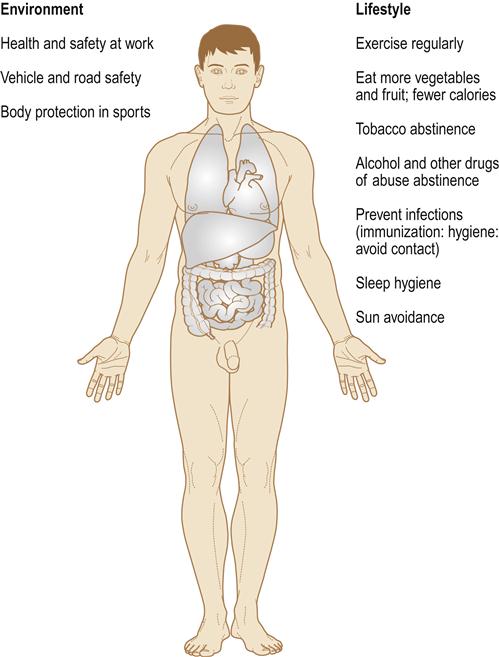Health promotion
Causes of disease are genetic (inherited) or acquired – which can be environmental (from trauma, infection, chemicals or irradiation) or related to lifestyle (e.g. lack of exercise, poor diet, habits – tobacco, alcohol, drugs, betel and others). Many diseases result from an interaction of several of these factors.
General Health Promotion
Since disease arises from the interactions of negative genetic, envir-onmental and lifestyle factors, it follows that it may be prevented by avoiding or minimizing these factors – as summarized in Table 36.1 and Figure 36.1. Already the effects of genetic diseases like haemophilia can be minimized by providing the missing protein (blood clotting factor VIII) and, in the future, genetic manipulation may be more widely possible (‘gene therapy’). The term ‘lifestyle’ refers to how individuals live their life and how they handle problems and interpersonal relations – ‘the unique way in which individuals try to realise their fictional final goal and meet or avoid the three main tasks of life: work, community, love’ (Adler). Lifestyle choices are crucial. Apart from improving or maintaining good health by avoiding contracting infections, including sexually shared infections (SSIs; Ch. 32), the three most important measures are to take regular exercise, eat a healthy diet, and avoid substance dependence and other deleterious habits.
Table 36.1
< ?comst?>
| Environmental | Lifestyle | ||
| Trauma | Avoid alcohol use, accidents, aggression and dangerous environments, activities and sports | Exercise | Take regular daily exercise for a minimum of 30 min |
| Infections | Avoid needlestick injuries and use latex protection (condoms, gloves, rubber dam). Be vaccinated | Diet | Eat a balanced diet with five portions of fruit/vegetables daily, minimize sugar and avoid food fads |
| Chemical | Label and take care with toxic agents and avoid communicable diseases | Substance dependence | Abstain if possible from use of tobacco, alcohol, recreational drugs and betel |
| Irradiation | Minimize exposure (to sun, X-rays, lasers, damaging lights, etc.) and use safety measures such as protective eyewear and screens | ||
< ?comen?>< ?comst1?>

< ?comst1?>
< ?comen1?>

Exercise
When exercise is combined with a proper diet, weight can be controlled and obesity – a major risk factor for many diseases – prevented. In contrast, physical inactivity often occurs together with an unhealthy diet, contributing to obesity, diabetes, heart disease and cancer.
There are real health benefits from exercise, ranging from protecting against cardiac disease (hypertension, atheroma and coronary artery disease) to reducing the chances of cancer and Alzheimer disease. In addition, exercise can: increase stamina; improve brain function; reduce stress (by releasing endorphins), depression and anxiety; control weight; build and maintain healthy bones, muscles and joints; and reduce the risk of developing diabetes.
To achieve health benefits, enough regular, moderately intense physical activity to burn an extra 200 calories daily is needed at the very least. At a minimum, this means about 30 minutes of activity daily – such as a brisk walk.
There are at least ten scientifically proven reasons for taking regular exercise, as follows:
1. Exercise helps minimize obesity. Exercise, by burning calories, helps minimize obesity (Ch. 27). Men who are obese are more likely than non-obese men to die from cancer of the colon, rectum or prostate; obese women are more likely to die from cancer of the gallbladder, breast, uterus, cervix or ovaries. Other health problems that stem from obesity include diabetes, ischaemic heart disease (IHD), hypertension, metabolic syndrome, stroke, gallbladder disease, liver disease, osteoarthritis, gout, sleep apnoea, menstrual irregularities and infertility in women, and psychosocial effects.
2. Exercise helps increase levels of HDL or ‘good’ cholesterol. Lev/>
Stay updated, free dental videos. Join our Telegram channel

VIDEdental - Online dental courses


